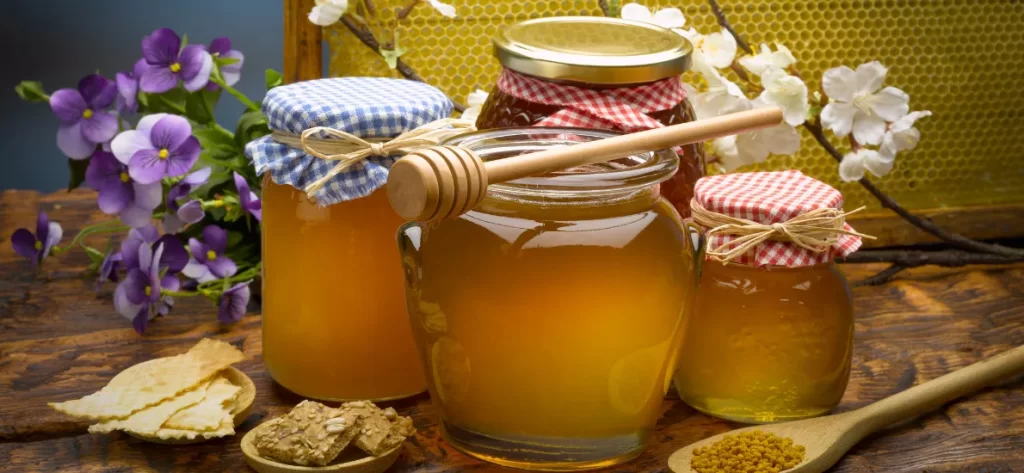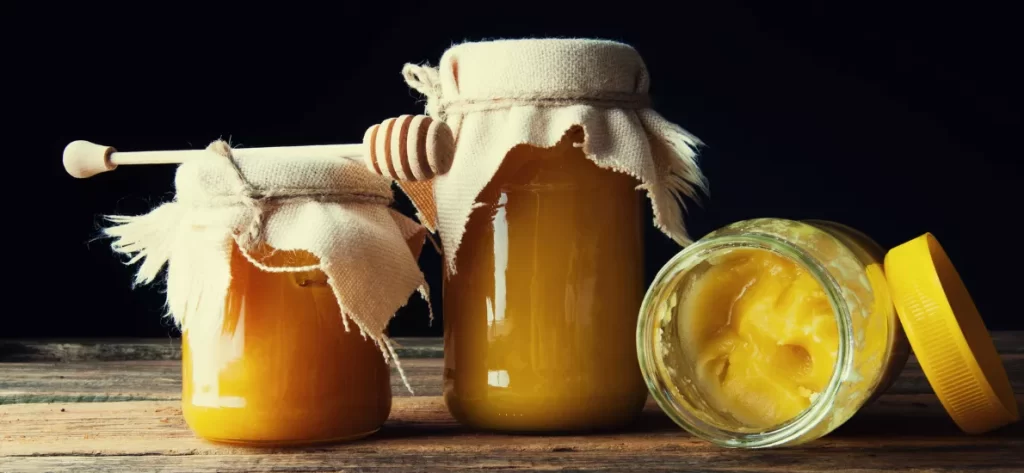I decided to write this article after several inquiries from relatives and friends as to whether honey bought the previous year or earlier may be eaten. I am sure that just the small changes that happen in the jars while standing lead them to the question such as does honey expire or does honey go bad?
Surely we all have a jar of honey in the pantry that we forgot about and it has been standing there for years. This usually happens when we buy larger quantities of honey, or a few jars of honey from different types of plants and producers, so some types pick up our sympathies before others.
While standing, the honey may have changed color or crystallized. If you were thinking of throwing it away, think again. You don’t have to throw that honey away! Even if honey had been on your shelf for 2000 years, that honey would have been as good as the day you opened it.
What Makes Honey A Special Food?
With longevity, honey does not lose its properties, especially medicinal ones, which makes it completely different from other foods. This natural food supplement, and also food for some peoples, is called a super food by many, because of its important properties for human health.
The answer to the question of what makes honey a special food is as complex as its taste, because there is no food source without an expiration date, without including a number of factors that work together in perfect harmony.
Honey is made up of about 80 percent sugars (a mixture of fructose and glucose) and 17 percent water. The remaining 3 percent is a mixture of vitamins, minerals, enzymes, pollen and a combination of flavors.

Honey contains almost no water, so the development of microorganisms and bacteria is difficult, and this affects the shelf life of honey.
Its pH acidity is between 3 and 4.5, which is enough to destroy everything that would be desirable to settle in honey. Thus, the chances of bacteria surviving are very small.
And bees affect its longevity. Even during the process of creating honey, bees remove almost all water from it by waving their wings, and they also have an enzyme that they expel which in turn, mixed with nectar, creates glucose acid and hydrogen peroxide, which fight against all the negative things planned to be found in honey.
In order for honey to spoil, something needs to get into it from the outside, but no organism in honey can survive long enough to spoil it.
What Is The Best Way To Store Honey?
One of the basic prerequisites for enjoying honey is the proper storage of honey and handling the packaging in which it is contained. The second prerequisite is the correct path from the hive to the consumer.
Storing honey is quite simple. Proper storage of honey can prevent or slow down the onset of changes. In this way we can preserve its beneficial and healing properties for as long as possible.
In large bottling plants, there are certain rooms (chambers) that meet the most desirable conditions for long-term storage of honey from wrapping to filling into commercial packaging and shipment to points of sale.
To store smaller quantities of honey from our apiary or for occasional consumption, we must try to create the most desirable conditions without expensive devices and additional energy consumption.
Don’t worry if the honey suddenly changes from liquid to solid. Honey can develop small crystals and get a darker color. But that doesn’t mean there’s something wrong with it, it’s just crystallization.
Rules For Storing Honey
Impermeability – One of the most important storage conditions is a tightly closed glass container.
Temperature – The shelf life of honey depends on the temperature. The allowed temperature is from -6 to +20 degrees. Low temperatures are not harmful to honey, and high temperatures lead to the loss of all useful properties, so you should not store it in cabinets near stoves or heaters.
Light – Honey should be stored in a dark place. Do not leave bottles of honey on the kitchen table or window. When direct sunlight falls on this bee product, especially in a transparent container, its medicinal and nutritional value is significantly reduced.
Humidity – Honey is able to absorb moisture from the environment. Therefore, in order to best preserve the useful qualities of the product, leave the honey in a dry place with an optimal humidity of about 60%. The ability of hygroscopicity, especially in rooms with high humidity, causes dilution of the consistency of the product and its deterioration. The room should be well ventilated so that no mold can appear.
Smells – Honey easily absorbs foreign odors, so it is not recommended to keep it with spices, garlic or onions, pickles and other unpleasant substances, such as gasoline or paint. Also, do not place bottles near flour-like products – due to the sticky consistency of honey, flour particles can settle on its surface, causing fermentation. Smells of tobacco or smoke can penetrate the composition of nectar.
Can Honey Go Bad?
Honey can remain edible for years, even decades. But honey is a natural product, which means it will change over time. In honey, these changes may include a darker color, a thicker consistency, and a different taste. But can honey go bad?
Regardless of whether it is raw or heat-treated honey, if the honey is stored in a container with a lid and if no water is added to it (either by human hand or from moisture in the air), it will not go bad.
Thanks to the low water content, honey will not spoil in the traditional sense, which means that mold or dangerous bacteria will not grow in the jar of honey. Even if stored properly, its aroma and taste can begin to fade with age, but if you are not a professional “taster” of honey, you may not even notice it.
Honey cannot go bad unless some additives are added to it and it must not be exposed to adverse weather conditions, for example, it must not be constantly in the sun.
Does Honey Expire?
And does honey expire? Whenever you buy honey in gallons, there is always a printed expiration date, as well as any product that comes from the factory.
Does honey have an expiration date? Natural, properly preserved honey has no shelf life, and cannot go bad.
Archaeologists have found thousands of years old honey in ancient Egyptian tombs, and it was still good! So, the next time you examine the shelf life of your long-lost gallons of honey, know that it is very unlikely to have expired. Of course, only if you bought 100% pure honey.

END
Questions about whether honey can go bad and whether honey can expire are common among all generations. How many times when a member of our family, while tasting a new type of honey, says that the honey has expired or has went bad. I am often in a situation to explain and give answers to these two questions.
But one thing is clear. Well-kept honey cannot be spoiled, no matter how much it stands on your shelf. As I have already written, honey can change color and texture over time, from clear to cloudy, or grainy and thicker. As long as you are sure that the bottle is well closed and that the honey has not been exposed to moisture, the change in texture and color should not worry you.

